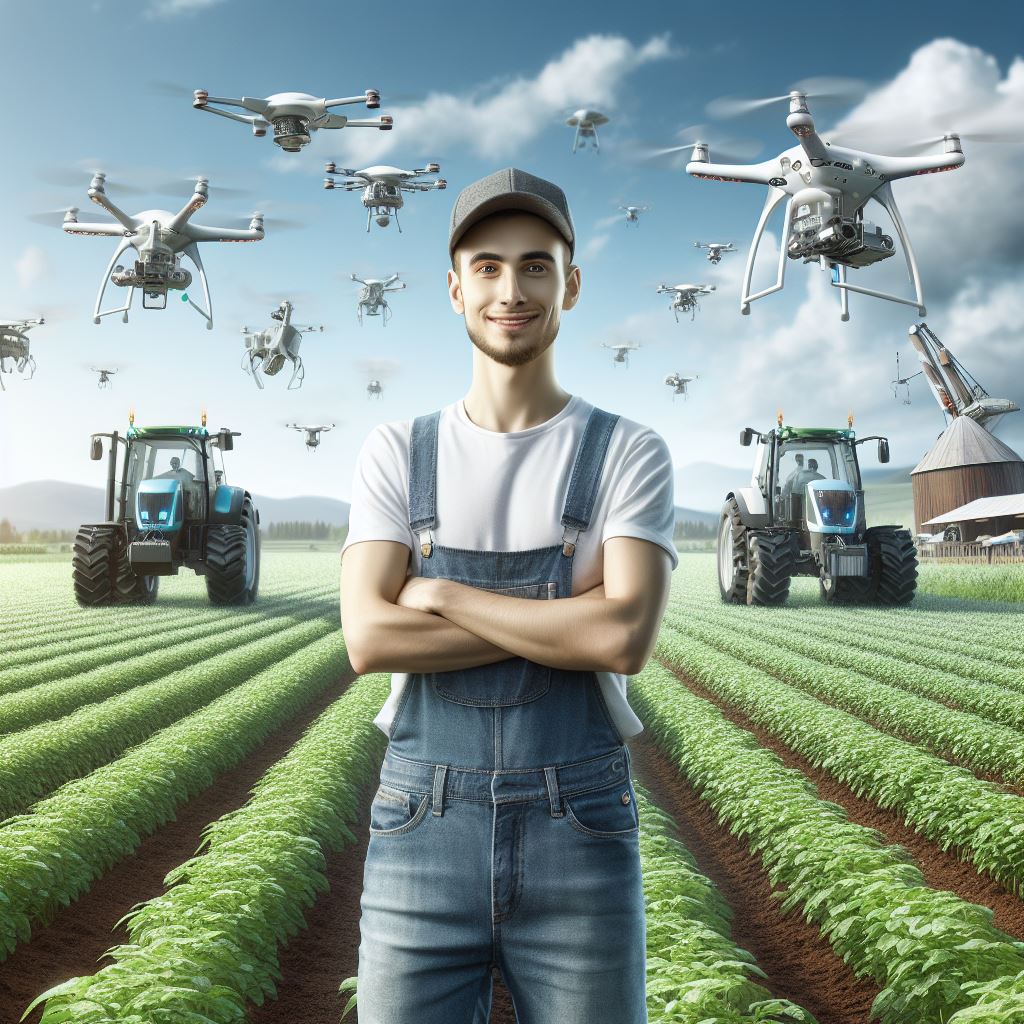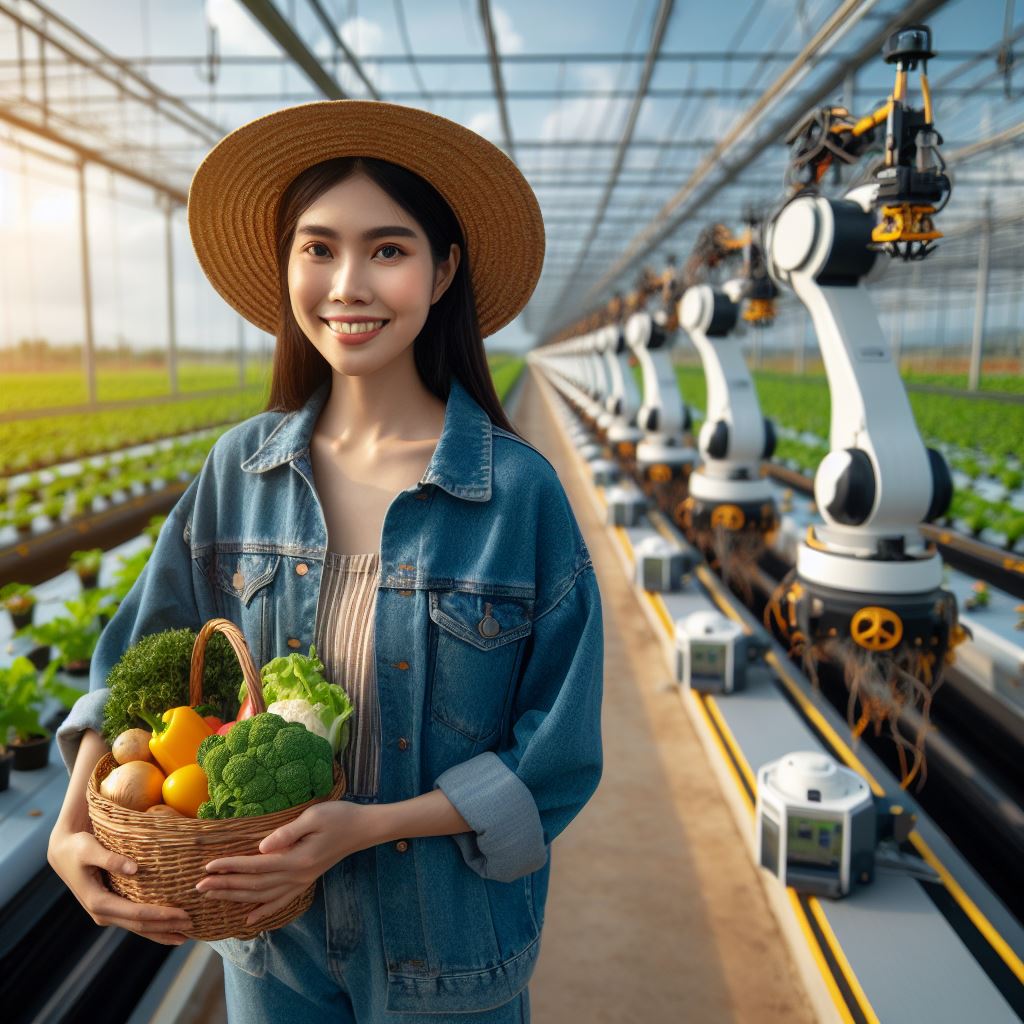Introduction
Brief overview of AI in agriculture
AI in Farms Impact on Agri Policies is revolutionizing the way farms operate, impacts efficiency and productivity.
It involves the use of advanced technologies like machine learning and robotics.
AI in farming enables precise data collection and analysis to make informed decisions.
Importance of agri policies in US
In the United States, agriculture policies play a crucial role in supporting farmers and maintaining food security.
They ensure fair practices, environmental sustainability, and economic stability in the agricultural sector.
With the integration of AI into farms, there is a need to adapt and update agri policies.
This is necessary to address potential challenges and harness the full potential of AI.
Agri policies can support the adoption of AI technologies by providing incentives and regulations.
They can facilitate research and development in AI applications for farming practices.
Furthermore, policies can address concerns like data privacy, cybersecurity, and ethical considerations related to AI.
By incorporating AI into agri policies, the US can stay at the forefront of agricultural innovation.
It can capitalize on the benefits of AI, such as increased productivity, reduced environmental impact, and improved food quality.
However, it is important to strike a balance between promoting AI adoption and ensuring equitable access and benefits for all farmers.
Essentially, the integration of AI in farms necessitates a recalibration of US agricultural policies.
This will enable the agricultural sector to harness the potential of AI while addressing potential challenges and ensuring equitable growth.
Transform Your Agribusiness
Unlock your farm's potential with expert advice tailored to your needs. Get actionable steps that drive real results.
Get StartedAI Adoption in US Farms
The current state of AI adoption in US farms is on the rise.
Farmers are increasingly embracing AI technology to improve their farming practices.
Benefits of AI in farming practices
The benefits of AI in farming are numerous and impactful.
AI enables farmers to optimize the use of resources such as water, fertilizers, and pesticides.
With AI, farmers can accurately analyze soil conditions and apply the right amount of nutrients.
AI-powered drones are used to monitor crop health, identify diseases, and prevent pest infestations.
Robotic systems equipped with AI are employed in tasks like harvesting, sorting, and packaging crops.
AI-based weather forecasting helps farmers make informed decisions about planting and irrigation.
Machine learning algorithms analyze data to maximize crop yield and reduce waste.
AI tools enable precision agriculture, leading to increased efficiency and cost savings.
The FarmView program utilizes AI and satellite imagery to monitor crop growth and identify problem areas.
AI-guided autonomous tractors perform soil cultivation, sowing, and weed control with precision.
Examples of AI tools used in US farms
In dairy farms, AI systems monitor cow behavior, detect diseases, and optimize milking processes.
AI-driven predictive analytics help farmers make predictions about crop prices and market demand.
AI-powered robots assist in labor-intensive tasks, improving productivity and reducing the need for human labor.
Virtual assistants powered by AI provide farmers with real-time advice and suggestions.
Smart irrigation systems controlled by AI optimize water usage based on weather patterns and soil moisture.
AI algorithms analyze plant images to detect nutrient deficiencies and recommend appropriate treatments.
AI-based crop monitoring systems provide early detection of diseases and pests, enabling targeted interventions.
AI-powered robots can navigate through fields, identifying and removing invasive plants and weeds.
Overall, the adoption of AI in US farms is transforming the agricultural industry.
Farmers are experiencing increased productivity, reduced costs, and improved sustainability through AI integration.
The use of AI tools and technologies in farming practices is expected to continue growing in the coming years.
Government policies should support and encourage the adoption of AI in farms to ensure a sustainable and efficient agricultural sector.
Showcase Your Farming Business
Publish your professional farming services profile on our blog for a one-time fee of $200 and reach a dedicated audience of farmers and agribusiness owners.
Publish Your ProfileBy embracing AI, US farms can address various challenges such as climate change, labor shortages, and food security.
Generally, AI is revolutionizing farming practices in the US, bringing significant benefits to farmers and the agricultural industry as a whole.
Computational power and advanced algorithms enable optimized resource utilization, precise crop management, and enhanced decision-making.
As AI adoption continues to expand, farms can expect increased efficiency, improved sustainability, and economic growth.
Government policies play a crucial role in facilitating the integration of AI into farming, ensuring a thriving agricultural sector that meets the demands of the future.
Read: Latest USDA Regulations: How They Affect Farmers
Impact of AI on US Agri Policies
Changes in labor requirements and workforce
- AI technology in farms could reduce the need for manual labor.
- This may lead to a shift in the agricultural workforce towards more skilled roles.
- Job loss in traditional farming sectors could be a challenge for policy-makers.
Efficiency improvements in crop production and livestock management
- AI-powered tools can optimize and automate various agricultural tasks.
- Farmers can use data-driven insights to make informed decisions about resource allocation.
- Improved efficiency can lead to increased yields and reduced production costs.
Environmental sustainability and resource management
- AI can help farmers implement precision agriculture techniques.
- Better monitoring and analysis of soil conditions can reduce the use of fertilizers and water.
- Policies may promote the adoption of AI to address environmental concerns.
Food safety and traceability
- AI can be used to monitor and track the safety of food products throughout the supply chain.
- Improved traceability can enhance consumer confidence in the quality of agricultural products.
- US agri policies may need to incorporate AI-based systems for food safety regulations.
Potential policy adjustments to accommodate AI technologies
- Current policies may need to be updated to support the integration of AI in farms.
- New regulations may be necessary to ensure fair competition and data privacy in the agri-tech sector.
- Government incentives can encourage farmers to adopt AI technologies in their operations.
Summarily, the impact of AI on US agri policies will be significant.
It will bring about changes in labor requirements and workforce composition.
Efficiency improvements in crop production and livestock management will benefit farmers and the environment.
Food safety and traceability can be enhanced through AI technologies.
Policy adjustments will be necessary to accommodate the integration of AI in farms and promote sustainable and technologically advanced agriculture.
Read: Agricultural Subsidies in 2024: A Detailed Overview

Challenges and Concerns
Addressing several challenges and concerns is necessary when farms integrate AI.
Ethical considerations surrounding AI in farms:
- Responsible utilization of AI technologies is essential to ensure the welfare of animals and the environment.
- Concerns about the potential exploitation of animals and the ethical treatment of livestock.
- Issues of transparency and accountability in AI systems used on farms.
- The need to establish clear ethical guidelines and regulations to govern AI use in agriculture.
Potential job displacement and retraining
- Automation through AI could lead to job losses in the agricultural sector.
- AI systems may require retraining of farmers and laborers.
- Balancing the benefits of AI with the preservation of human employment.
- Investing in programs and initiatives to help affected individuals transition into new roles.
Data privacy and security concerns
- The use of AI requires vast amounts of data, raising concerns about privacy and ownership.
- Farmers and stakeholders need reassurance that their data is protected and not misused.
- Implementing robust data security measures to prevent unauthorized access and breaches.
- Regulating the collection, storage, and use of agricultural data to maintain trust in AI systems.
Bias and fairness in AI algorithms:
- AI algorithms should be developed and trained to be unbiased and fair.
- Ensuring that AI systems do not perpetuate existing social, economic, or racial biases.
- Addressing concerns that AI may discriminate against certain farmers or agricultural practices.
- Regular audits and evaluations of AI systems to identify and rectify potential biases.
Overall, while AI has the potential to revolutionize farming practices in the United States, it also presents challenges and concerns that need to be carefully addressed.
Ethical considerations, potential job displacement, data privacy and security issues, and bias in AI algorithms all require proactive measures, regulations, and collaborations between stakeholders to ensure the responsible and beneficial integration of AI in farms.
Read: Organic Certification Process Simplified
Potential Solutions and Mitigation Strategies
Collaboration between policymakers, researchers, and farmers
A successful integration of AI in farms requires the collaboration and active involvement of policymakers, researchers, and farmers.
Policymakers should engage in meaningful dialogues with farmers and researchers to understand their specific needs and challenges.
This collaboration can help in crafting policies that promote responsible AI adoption in agriculture.
Creation of AI-specific regulations and standards
Given the potential impact of AI in agriculture, it is important to establish regulations and standards specific to AI technologies.
These regulations should encompass aspects such as data privacy, algorithmic transparency, and ethical use of AI.
Clear guidelines can ensure that AI is used responsibly and in alignment with societal values.
Investments in education and training programs
To fully harness the potential of AI in farms, farmers and agricultural workers need to be equipped with the necessary knowledge and skills.
Investing in education and training programs can help farmers understand AI concepts, improve their data literacy, and learn how to effectively integrate AI tools into their farming practices.
This will empower them to make informed decisions and optimize their agricultural processes.
Ensuring transparency and accountability in AI technologies
Transparency is crucial when it comes to AI in farms. Farmers should have access to clear information about the algorithms and data used in AI systems.
This transparency will enable them to better understand how AI technologies make decisions and take appropriate actions when needed.
Additionally, establishing mechanisms for accountability, such as third-party audits, can ensure that AI technologies operate in a responsible and fair manner.
Ultimately, the successful integration of AI in farms requires collaborative efforts between policymakers, researchers, and farmers.
This collaboration should be supported by the creation of AI-specific regulations and standards. Investments in education and training programs can equip farmers with the necessary skills to harness AI’s potential effectively.
Finally, ensuring transparency and accountability in AI technologies will build trust among stakeholders and enable responsible AI adoption in agriculture.
Read: Farming Aid Laws: 2024’s Comprehensive Guide
Conclusion
Recap of key points discussed
In this blog post, we explored the impact of AI in US farms and its implications on agricultural policies.
We discussed several key points, including the benefits of AI technology in optimizing farm operations and improving efficiency.
We also highlighted the need for adapting agricultural policies to harness the full potential of AI advancements.
Importance of adapting agri policies to AI advancements
By incorporating AI into agri-policies, the US can promote innovation and sustainability in the agricultural sector. Looking ahead, the future prospects of AI in US farms are promising, with the potential to revolutionize the industry.
However, this also poses challenges for policymakers, who must consider ethical, legal, and social implications.
Future prospects of AI in US farms and policy implications
Overall, embracing AI in US farms and implementing appropriate policies can lead to a more productive and sustainable agricultural sector.




